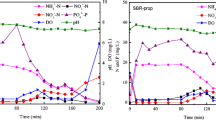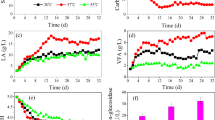Abstract
The carbon source plays an important role in denitrification for nitrogen removal from wastewater. In this study, the denitrification performance and nitrous oxide (N2O) generation in four sequencing batch reactors (SBRs) fed with methanol, ethanol, sodium acetate and glucose were investigated. The maximum N2O generation was achieved when glucose was used as the carbon source, with a N2O conversion ratio of 56%. The high conversion ratio was contributed from the organic carbon of glucose and the glucose-acclimated denitrifiers. The nitrite accumulation and N2O generation during denitrification with glucose as the carbon source increased with increasing chemical oxygen demand to nitrogen ratios in the range of 2–8. The microbial community and their relative abundances varied greatly in the four reactors, and a low abundance of Thauera was found in the glucose-fed SBR, which might contribute to the greater N2O production. Practical strategies for N2O generation from the denitrification process using glucose as the carbon source were proposed so as to achieve energy recovery from nitrogen in wastewater.





Similar content being viewed by others
Explore related subjects
Discover the latest articles, news and stories from top researchers in related subjects.References
Adouani N, Lendormi T, Limousy L, Sire O (2010) Effect of the carbon source on N2O emissions during biological denitrification. Resour Conserv Recycl 54(5):299–302
Anthonisen AC, Loehr RC, Prakasam TBS, Srinath EG (1976) Inhibition of nitrification by ammonia and nitrous acid. J Water Pollut Control Fed 127(3):835–852
APHA (1995) Standard methods for the examination of water and wastewater. American Public Health Association, Washington DC
Baytshtok V, Lu H, Park H, Kim S, Yu R, Chandran K (2009) Impact of varying electron donors on the molecular microbial ecology and biokinetics of methylotrophic denitrifying bacteria. Biotechnol Bioeng 102(6):1527–1536
Beline F, Martinez J, Chadwick D, Guiziou F, Coste CM (1999) Factors affecting nitrogen transformations and related nitrous oxide emissions from aerobically treated piggery slurry. J Agric Eng Res 73(3):235–243
Cherchi C, Onnis-Hayden A, El-Shawabkeh I, Gu AZ (2009) Implication of using different carbon sources for denitrification in wastewater treatments. Water Environ Res 81(8):788–799
Constantin H, Fick M (1997) Influence of C-sources on the denitrification rate of a high-nitrate concentrated industrial wastewater. Water Res 31(3):583–589
Etchebehere C, Errazquin MI, Dabert P, Moletta R, Muxi L (2001) Comamonas nitrativorans sp. nov., a novel denitrifier isolated from a denitrifying reactor treating landfill leachate. Int J Syst Evol Microbiol 51(3):977–983
Ge S, Peng Y, Wang S, Lu C, Cao X, Zhu Y (2012) Nitrite accumulation under constant temperature in anoxic denitrification process: the effects of carbon sources and COD/NO3-N. Biores Technol 114:137–143
Glass C, Silverstein JA (1998) Denitrification kinetics of high nitrate concentration water: pH effect on inhibition and nitrite accumulation. Water Res 32(3):831–839
Glass C, Silverstein J, Oh J (1997) Inhibition of denitrification in activated sludge by nitrite. Water Environ Res 69(6):1086–1093
Intergovernmental Panel on Climate Change (IPCC) (2000) Special report on emissions scenarios. Cambridge University Press, Cambridge
Khan ST, Hiraishi A (2002) Diaphorobacter nitroreducens gen. nov., sp. nov., a poly (3-hydroxybutyrate)-degrading denitrifying bacterium isolated from activated sludge. J Gen Appl Microbiol 48(6):299–308
Lemaire R, Meyer R, Taske A, Crocetti GR, Keller J, Yuan Z (2006) Identifying causes for N2O accumulation in a lab-scale sequencing batch reactor performing simultaneous nitrification, denitrification and phosphorus removal. J Biotechnol 122(1):62–72
Lu H, Chandran K, Stensel D (2014) Microbial ecology of denitrification in biological wastewater treatment. Water Res 64:237–254
Mwaikono KS, Maina S, Sebastian A, Schilling M, Kapur V, Gwakisa P (2016) High-throughput sequencing of 16S rRNA gene reveals substantial bacterial diversity on the municipal dumpsite. BMC Microbiol 16:145
Pan Y, Ni BJ, Bond PL, Ye L, Yuan Z (2013) Electron competition among nitrogen oxides reduction during methanol-utilizing denitrification in wastewater treatment. Water Res 47(10):3273–3281
Scherson YD, Wells GF, Woo SG, Lee J, Park J, Cantwell BJ, Criddle CS (2013) Nitrogen removal with energy recovery through N2O decomposition. Energy Environ Sci 6(1):241–248
Scherson YD, Woo SG, Criddle CS (2014) Production of nitrous oxide from anaerobic digester centrate and its use as a co-oxidant of biogas to enhance energy recovery. Environ Sci Technol 48(10):5612–5619
Smolders GJF, Van der Meij J, Van Loosdrecht MCM, Heijnen JJ (1994) Model of the anaerobic metabolism of the biological phosphorus removal process: stoichiometry and pH influence. Biotechnol Bioeng 43(6):461–470
Tallec G, Garnier J, Billen G, Gousailles M (2008) Nitrous oxide emissions from denitrifying activated sludge of urban wastewater treatment plants, under anoxia and low oxygenation. Biores Technol 99(7):2200–2209
Xie L, Chen J, Wang R, Zhou Q (2012) Effect of carbon source and COD/NO3–N ratio on anaerobic simultaneous denitrification and methanogenesis for high-strength wastewater treatment. J Biosci Bioeng 113(6):759–764
Yang X, Wang S, Zhou L (2012) Effect of carbon source, C/N ratio, nitrate and dissolved oxygen concentration on nitrite and ammonium production from denitrification process by Pseudomonasstutzeri D6. Biores Technol 104:65–72
Zhao J, Huang N, Hu B, Jia L, Ge G (2016) Potential of nitrous oxide recovery from an aerobic/oxic/anoxic SBR process. Water Sci Technol 73(5):1061–1066
Acknowledgement
This research was supported by the Shenzhen Science and Technology Plan Project (Grant Number: JSKF20150717163429311).
Author information
Authors and Affiliations
Corresponding author
Additional information
Editorial responsibility: M. Abbaspour.
Rights and permissions
About this article
Cite this article
Zhao, Y., Miao, J., Ren, X. et al. Effect of organic carbon on the production of biofuel nitrous oxide during the denitrification process. Int. J. Environ. Sci. Technol. 15, 461–470 (2018). https://doi.org/10.1007/s13762-017-1397-9
Received:
Revised:
Accepted:
Published:
Issue Date:
DOI: https://doi.org/10.1007/s13762-017-1397-9




